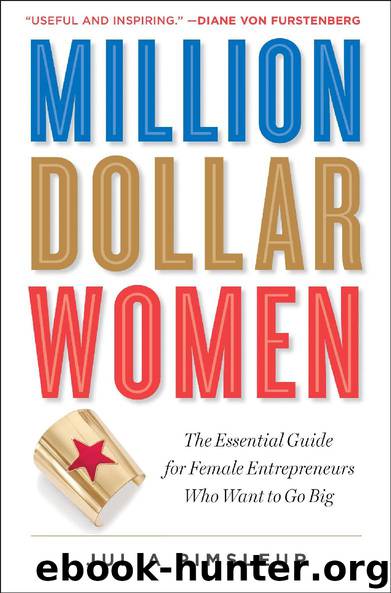Million Dollar Women by Julia Pimsleur

Author:Julia Pimsleur
Language: eng
Format: epub
Publisher: Simon & Schuster
2. WHEN IS IT THE RIGHT TIME TO RAISE MONEY?
Raising money isn’t right for every person or every business. The vast majority of businesses do not raise angel or venture capital; many are able to get loans, or tap into their customer base and get them to pre-pay for products, or fund growth off revenues. But if you have solid reasons to believe there is a bigger opportunity you could go after if you had more money for professional staff, better marketing, or improved technology, then raising funds is likely the way to go. You need to see not just modest increased revenues but a truly big opportunity you want to go after—and you have to be able to tell the story of how the new capital will get you there. You do not need to have high current revenues to raise angel money ($100,000–$300,000 is considered good early traction), but if you are a first-time entrepreneur it’s best to have already proven the value of your company in some way before you set out to raise venture capital, through either revenue or growth. This can mean having reached about $1 million in revenues, having secured valuable patents or intellectual property (I.P.), or having one million eyeballs looking at your site.
If you have the kind of business where you can get to positive cash flow after raising friends-and-family or angel money, you may opt to build more slowly and reinvest your profits instead of raising additional capital. You can also negotiate a strategic partnership (see glossary) with a vendor or partner that saves you significant cash because they are giving you favorable terms or agreeing to get paid on a longer timetable. Then you can use the cash in your business. That is likely a better and easier solution than raising funds. But those situations are fairly rare. If you are like most entrepreneurs, you need access to additional capital to make investments in inventory, sales, and marketing before you can take your business to scale. As Verne Harnish puts so delicately in his book Scaling Up, a must read for every entrepreneur, “Growth sucks cash.” 13 Here is the rub: not having cash will actually hamper your growth. While there certainly are businesses that use their annual profits to finance growth and thereby avoid raising money, they are in the minority. The majority of entrepreneurs need capital to take their business to the next level. That’s why it’s called growth capital.
With Little Pim, I was building a brand and competing for customers and “share of wallet” (how much consumers spend on a certain kind of product or service) with the likes of Disney, Nickelodeon, and Fisher Price. To go big, I had to have a substantial marketing budget and professional staff who knew how to deploy it. I also had to earn a salary to help support my family, even if I was paying myself below market rate for a CEO.
What’s more, I felt certain there would be a
Download
This site does not store any files on its server. We only index and link to content provided by other sites. Please contact the content providers to delete copyright contents if any and email us, we'll remove relevant links or contents immediately.
| Private Equity | Valuation |
| Venture Capital |
The Black Swan by Nassim Nicholas Taleb(7129)
Bad Blood by John Carreyrou(6621)
Pioneering Portfolio Management by David F. Swensen(6300)
Millionaire: The Philanderer, Gambler, and Duelist Who Invented Modern Finance by Janet Gleeson(4478)
Skin in the Game by Nassim Nicholas Taleb(4248)
The Money Culture by Michael Lewis(4207)
Bullshit Jobs by David Graeber(4190)
Skin in the Game: Hidden Asymmetries in Daily Life by Nassim Nicholas Taleb(4006)
The Wisdom of Finance by Mihir Desai(3746)
Blockchain Basics by Daniel Drescher(3582)
Liar's Poker by Michael Lewis(3448)
Fooled by Randomness: The Hidden Role of Chance in Life and in the Markets by Nassim Nicholas Taleb(3124)
Hands-On Machine Learning for Algorithmic Trading by Stefan Jansen(3072)
Mastering Bitcoin: Programming the Open Blockchain by Andreas M. Antonopoulos(3042)
The Intelligent Investor by Benjamin Graham Jason Zweig(3041)
The Power of Broke by Daymond John(2986)
Investing For Dummies by Eric Tyson(2953)
You Are What You Risk by Michele Wucker(2835)
Bull by the Horns: Fighting to Save Main Street From Wall Street and Wall Street From Itself by Sheila Bair(2770)
